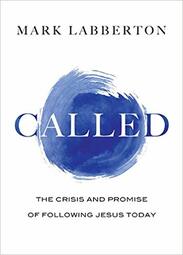In the church world, people talk about being “called” a lot. But what exactly does it mean to be called? Mark Labberton attempts to answer this very question in his book, Called: The Crisis and Promise of Following Jesus Today.

According to Mark, the “primary call of God that creates and defines the church” is to follow Jesus. He expands upon this idea by saying “The heart of God’s call is this: that we receive and live the love of God for us and for the world.”
I love how all-encompassing Mark’s definition of being called is, especially since even though I’ve worked in professional ministry for my entire adult life, I still encounter people who regularly believe only ordained pastors are called. But as Mark explains, “Calling…is about God’s desire for all of our lives as ambassadors of God’s kingdom.”
Like others who have written about vocation, Mark describes two categories of call, one universal call for all followers of Jesus to “belong to and live for the flourishing of God’s purposes of the world” and a second, more specific call that “includes direction in relation to such things as jobs, gifts, relationships, and more.”
One of Mark’s unique contribution to the vocation conversation is his discussion of relocating - where he wrestles with the place to which we are called. This is an important aspect of vocation because as Mark writes, “The church can’t live its vocation if it doesn’t know where it lives.”
According to Mark, “Many in America believe they live in the Promised Land.” But Mark reminds readers that the “premise of God’s Promised Land to Israel was not that it was a place to pluck God’s benefits. It was rather where God’s people were to thrive in the grace of living out the call to be God’s people. For Israel, blessings were not the goal; they were the encouragement along the path of living God’s way.”
Mark, however, challenges these assumptions. He believes “the people of God live in exile. Exile – life as strangers in a strange land – is our context.” He again uses Israel’s example to flesh out what this means for us, saying “The point of exile of Israel: They were to seek the shalom of the city in which they were oppressed for in its shalom they would find their shalom.” What this means is that “an exilic community offers much less and invites you to bring all you can to the community itself.” That’s a very different paradigm than many American churches are used to operating under.
Another rich contribution that Mark makes to the conversation about vocation is his emphasis on the church and in particular, on community. As a youth pastor, I’ve seen far too many people be convinced God was calling them to do something only to realize their gifts did not support that calling. Mark suggests, “If we think God is guiding us, but no one in the body of Christ that best knows us can stand alongside us and affirm it, that sense of guidance is likely doubtful and may be worth reconsidering before acting.”
Although people who are well-versed in vocation will recognize many of the themes Mark discusses in Called, this is still a very worthwhile read for anyone interested in this topic. In fact, it’s worth reading Called simply for Mark’s treatment of location as it relates to vocation. That alone will challenge most readers to think very differently about their calling – and that of their church.
**********************************************************
Disclosure: I received a free copy of Called from InterVarsity Press in exchange for a fair and honest review.